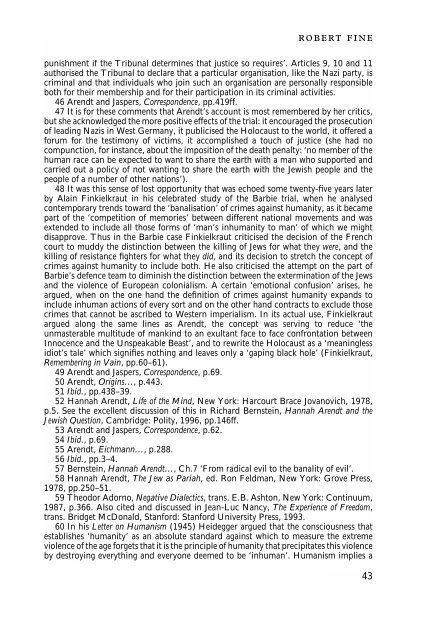Create successful ePaper yourself
Turn your PDF publications into a flip-book with our unique Google optimized e-Paper software.
obert fine<br />
punishment if <strong>the</strong> Tribunal determines that justice so requires’. Articles 9, 10 and 11<br />
authorised <strong>the</strong> Tribunal to declare that a particular organisation, like <strong>the</strong> Nazi party, is<br />
criminal and that individuals who join such an organisation are personally responsible<br />
both for <strong>the</strong>ir membership and for <strong>the</strong>ir participation in its criminal activities.<br />
46 Arendt and Jaspers, Correspondence, pp.419ff.<br />
47 It is for <strong>the</strong>se comments that Arendt’s account is most remembered by her critics,<br />
but she acknowledged <strong>the</strong> more positive effects of <strong>the</strong> trial: it encouraged <strong>the</strong> prosecution<br />
of leading Nazis in West Germany, it publicised <strong>the</strong> <strong>Holocaust</strong> to <strong>the</strong> world, it offered a<br />
forum for <strong>the</strong> testimony of victims, it accomplished a touch of justice (she had no<br />
compunction, for instance, about <strong>the</strong> imposition of <strong>the</strong> death penalty: ‘no member of <strong>the</strong><br />
human race can be expected to want to share <strong>the</strong> earth with a man who supported and<br />
carried out a policy of not wanting to share <strong>the</strong> earth with <strong>the</strong> Jewish people and <strong>the</strong><br />
people of a number of o<strong>the</strong>r nations’).<br />
48 It was this sense of lost opportunity that was echoed some twenty-five years later<br />
by Alain Finkielkraut in his celebrated study of <strong>the</strong> Barbie trial, when he analysed<br />
contemporary trends toward <strong>the</strong> ‘banalisation’ of crimes against humanity, as it became<br />
part of <strong>the</strong> ‘competition of memories’ between different national movements and was<br />
extended to include all those forms of ‘man’s inhumanity to man’ of which we might<br />
disapprove. Thus in <strong>the</strong> Barbie case Finkielkraut criticised <strong>the</strong> decision of <strong>the</strong> French<br />
court to muddy <strong>the</strong> distinction between <strong>the</strong> killing of Jews for what <strong>the</strong>y were, and <strong>the</strong><br />
killing of resistance fighters for what <strong>the</strong>y did, and its decision to stretch <strong>the</strong> concept of<br />
crimes against humanity to include both. He also criticised <strong>the</strong> attempt on <strong>the</strong> part of<br />
Barbie’s defence team to diminish <strong>the</strong> distinction between <strong>the</strong> extermination of <strong>the</strong> Jews<br />
and <strong>the</strong> violence of European colonialism. A certain ‘emotional confusion’ arises, he<br />
argued, when on <strong>the</strong> one hand <strong>the</strong> definition of crimes against humanity expands to<br />
include inhuman actions of every sort and on <strong>the</strong> o<strong>the</strong>r hand contracts to exclude those<br />
crimes that cannot be ascribed to Western imperialism. In its actual use, Finkielkraut<br />
argued along <strong>the</strong> same lines as Arendt, <strong>the</strong> concept was serving to reduce ‘<strong>the</strong><br />
unmasterable multitude of mankind to an exultant face to face confrontation between<br />
Innocence and <strong>the</strong> Unspeakable Beast’, and to rewrite <strong>the</strong> <strong>Holocaust</strong> as a ‘meaningless<br />
idiot’s tale’ which signifies nothing and leaves only a ‘gaping black hole’ (Finkielkraut,<br />
Remembering in Vain, pp.60–61).<br />
49 Arendt and Jaspers, Correspondence, p.69.<br />
50 Arendt, Origins…, p.443.<br />
51 Ibid., pp.438–39.<br />
52 Hannah Arendt, Life of <strong>the</strong> Mind, New York: Harcourt Brace Jovanovich, 1978,<br />
p.5. See <strong>the</strong> excellent discussion of this in Richard Bernstein, Hannah Arendt and <strong>the</strong><br />
Jewish Question, Cambridge: Polity, 1996, pp.146ff.<br />
53 Arendt and Jaspers, Correspondence, p.62.<br />
54 Ibid., p.69.<br />
55 Arendt, Eichmann…, p.288.<br />
56 Ibid., pp.3–4.<br />
57 Bernstein, Hannah Arendt…, Ch.7 ‘From radical evil to <strong>the</strong> banality of evil’.<br />
58 Hannah Arendt, The Jew as Pariah, ed. Ron Feldman, New York: Grove Press,<br />
1978, pp.250–51.<br />
59 Theodor Adorno, Negative Dialectics, trans. E.B. Ashton, New York: Continuum,<br />
1987, p.366. Also cited and discussed in Jean-Luc Nancy, The Experience of Freedom,<br />
trans. Bridget McDonald, Stanford: Stanford University Press, 1993.<br />
60 In his Letter on Humanism (1945) Heidegger argued that <strong>the</strong> consciousness that<br />
establishes ‘humanity’ as an absolute standard against which to measure <strong>the</strong> extreme<br />
violence of <strong>the</strong> age forgets that it is <strong>the</strong> principle of humanity that precipitates this violence<br />
by destroying everything and everyone deemed to be ‘inhuman’. Humanism implies a<br />
43

















